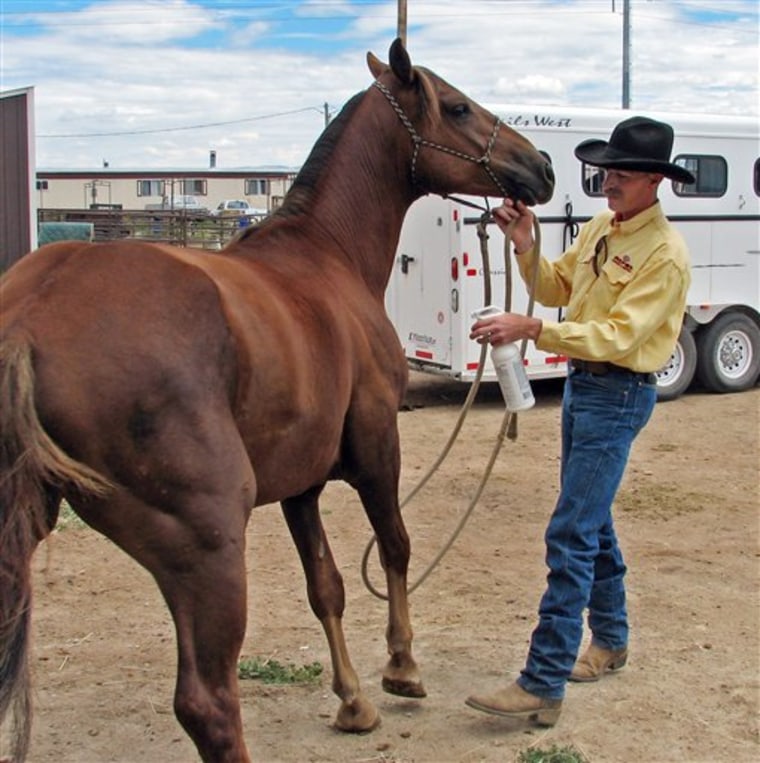As a Johnny Cash tune played over the loudspeakers, horse trainer Gary Main Jr. coaxed Victory through a display of discipline and skill inside the Wyoming State Fair arena.
Hundreds of potential horse buyers looked on as Victory stopped on a dime, backed up on command and trotted along the perimeter. On this day, the horses were not from breeders but rather the Western range — separated from their wild origins by only a few months of training.
Faced with a surplus of wild horses, the U.S. Bureau of Land Management and its nonprofit partner, the Mustang Heritage Foundation, have been holding a series of training contests and subsequent adoptions like the Mustang Challenge held in Wyoming this summer.
Adoption is likely the best outcome for the horses. The BLM, citing budget constraints and the ever-multiplying herds of mustangs that roam free on federal land in the West, said this summer it was studying ways to get rid of excess horses, including euthanasia.
Effort to boost adoptions
To try to boost the number of adoptions, Patti Colbert, executive director of the mustang foundation, came up with the idea of the horse-training competitions while watching reality TV shows.
"I figured if you could make over a house or a person or a truck, then we could take these mustangs and in a short amount of time show their value because of their trainability," Colbert said.
About 29,500 horses and 3,500 burros roam federal land in 10 states, according to the BLM. That's too many for the agency's rangeland management plans, which also account for other uses like wildlife habitat and livestock grazing.
"The wild horse population doubles about every four years, and the effects of that are they will overgraze the land," said Sally Spencer of the BLM's National Wild Horse and Burro Program. "If left unchecked, they would eat themselves out of house and home."
As potential owners wrestle with increased costs for animal feed and transportation, the government's longstanding adoption program has seen declining numbers, from about 5,700 in 2005 to less than 4,800 in 2007, according to the BLM. The Texas-based Mustang Heritage Foundation is working to change that.
It began holding mustang-training competitions last year, awarding thousands of dollars in prize money and culminating in adoptions at six events.
The group boasts a 100 percent adoption rate for participating horses, amounting to a total of about 850 horses adopted in the last year, in Texas, California, Nevada, Wisconsin and Wyoming.
The horses on display in the Mustang Challenge were rounded up from BLM land in Wyoming, where about 3,600 wild horses live. The 26 participating trainers picked up the horses from a holding facility 90 days before the competition.
Graded on the level of trust
Quinn Martin, a judge at the Wyoming competition, said he graded the contestants on the level of trust between trainer and horse.
"You can tell that horse is with him by the look in the horse's eye and how hard he's trying," Martin said.
Supporters of the training competitions say the contests help those efforts by disproving the notion that mustangs can't be trained.
Competitor Bryan Mantle, who has trained wild mustangs for 10 years on his family's Wheatland ranch, said the initial training is key to successful adoptions.
"People seem to be able to get along with them easier, and the horses end up having a home and not just coming back like a troubled pet," he said.
Boosting adoptions would help ease the strain the horses are placing on the BLM's holding facilities and budget.
The BLM culled more than 7,500 horses from the range last year, adding to the roughly 30,000 wild horses and burros that are cared for in short-term corrals and long-term pastures. This year, the agency is spending about 70 percent of its $37 million wild horse budget on holding costs, said BLM spokesman Tom Gorey.
Because of the overcrowding, the BLM announced in June that it was studying the possibility of euthanizing older horses or allowing their unrestricted sale. Critics say that would result in the horses being exported to Mexico or Canada for slaughter.
All horses adopted at auction
At the end of the Wyoming competition, all 26 horses were adopted at auction for a total of $47,500. Excluding BLM adoption fees, trainers received 20 percent of their mustang's price and the rest went to the Mustang Heritage Foundation.
Rhonda Sedgwick Stearns, a Newcastle rancher, paid $4,300 to take home Pistol, a 3-year-old gelding that placed sixth. The price was a good deal, she said, considering the time and cost associated with the training a horse.
Stearns said she intends to use Pistol as a ranch horse, which means long days of riding upward of 30 miles, possibly in muddy and icy terrain. That's one of the reasons she wanted a mustang.
"If you're riding one of these horses, they ran along their mothers when they were babies and so they learn to watch where they're going and know where their feet are," Stearns said.
For his part, Main ended up adopting Victory, who finished seventh, for $1,050. The two went back home to Laramie.
"His heart and his try are worth a thousands bucks," Main said. "So I'm not going to let somebody else walk away with him for that. He's going to make too nice of a horse."
